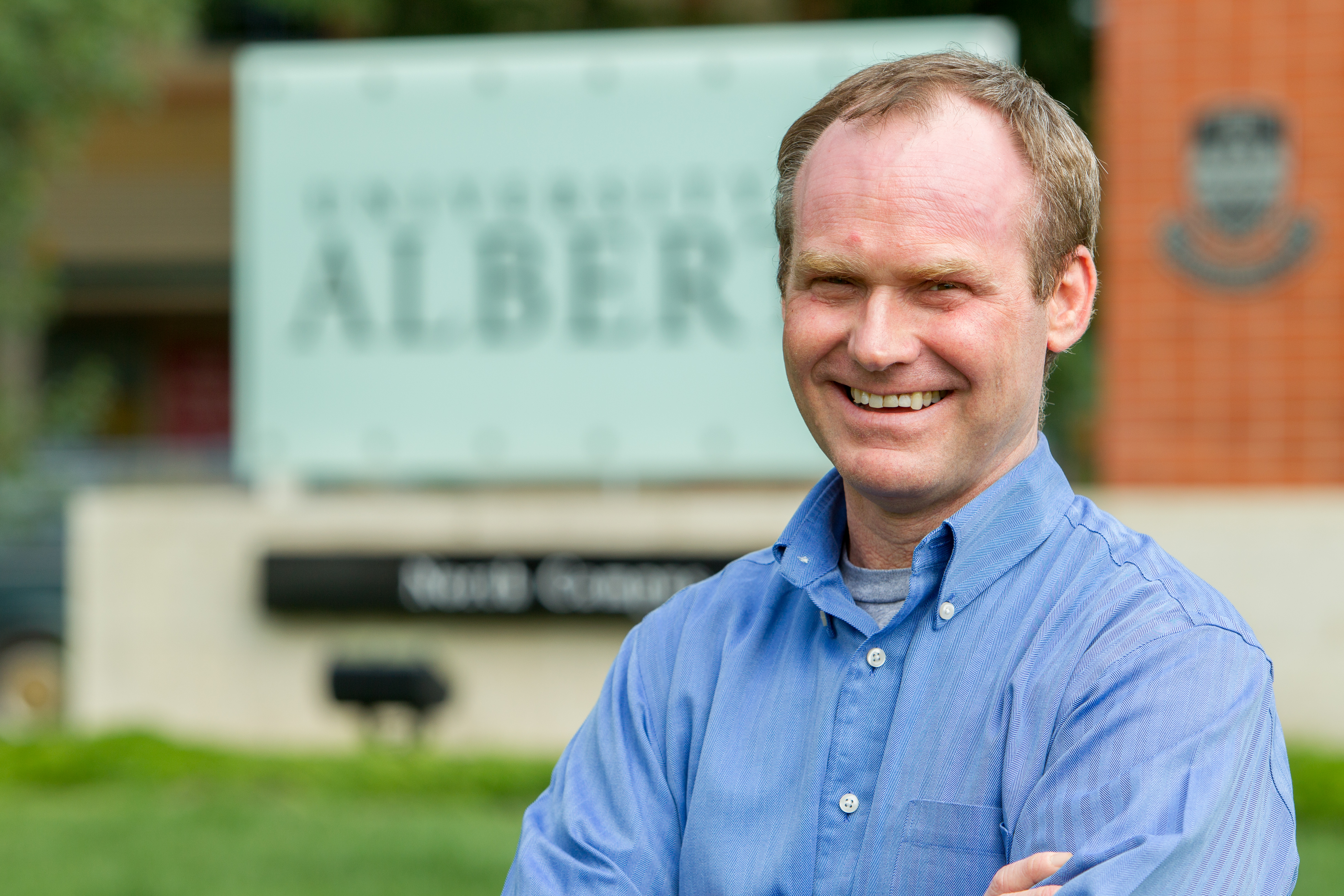
Michael Allan (left) leads a discussion with the members of the Evidence Based Medicine Working Group, which includes Scott Garrison, Adrienne Lindblad, Tina Korownyk, Michael Kolber, and Sharon Nickel. Colleague James McCormack is absent. (Photo: Jeff Hilbrecht)
Michael Allan unwinds in his chair, completely at ease. In the midst of a year-long sabbatical, it's the first time in weeks the family physician and professor with the Department of Family Medicine has visited the office he leads. But in many ways it's like he never left the small band of friends and colleagues known as the Evidence Based Medicine Working Group-slipping into his role as comfortably as slipping into an old sweater.
"We have been together about eight years," says Allan. "It began with just me and Tina Korownyk in 2008. Now there are seven of us, including one from outside the U of A. Everyone has their role and I think that's what makes the team work so well together."
The group is perhaps one of the Faculty of Medicine & Dentistry's brightest success stories-one now profiled in the pages and on the cover of the September issue ofCanadian Family Physician. The publication examines the group's many successful efforts in advancing evidence-based medicine throughout Canada, noting that "the seven-member team, with a bevy of other primary care providers, produce some of the most influential and heavily-accessed evidence by and for general practitioners in Canada and beyond."
Evidence-based medicine is an approach to medical practice intended to optimize decision-making by concentrating on the use of data from well-designed and conducted research. In its short existence, the team of family physicians who make up the group at the U of A have been on a mission to change ideas about tools, knowledge, practice and medicine. Much of the efforts focus on continuing medical education. It's an engine working on multiple fronts simultaneously, demonstrating that a small team can have a large reach and impact.
"We began with Tools for Practice in 2009, a bi-weekly article summarizing medical evidence on a clinical question with a focus on information that can modify a clinician's day-to-day practice," says Allan. "We started in Alberta and have since expanded all around Canada and the world. Our articles are distributed to over 30,000 clinicians now."
Since its humble beginning, the team's reach has grown quickly. It organizes road shows each year to speak with clinicians in rural Alberta communities about evidence-based medical topics, hosts the largest annual primary care conference in the province, and is responsible for one of the world's most popular medical podcasts (Best Science Medicine Podcast).
One of their major accomplishments was their first primary care guideline in 2015-subsequently published in Canadian Family Physician. The guideline has since become the number one accessed article in the journal over the past several years. According to Allan, that success involved a major shift in thinking about how guidelines are created.
"The vast majority of guidelines in Canada are done primarily by specialists in their field and they write them for how they think primary care should practice. But that can come with biases about what is most important in providing care. Ours is unique in that it was written by primary care, for primary care."
"As an example, if all you ever did on a car was fix transmissions and you never looked at anything else, you would begin to think that transmissions were the only thing that mattered in cars. So you can start developing some biases in that way."
"The vast majority of guidelines in Canada are done primarily by specialists in their field and they write them for how they think primary care should practice. But that can come with biases about what is most important in providing care. Ours is unique in that it was written by primary care, for primary care." -Michael Allan
Allan says what drove the team's thinking was to simplify the guideline, making it patient-centred and relevant to primary care. They also focused on ensuring the document prioritized communication with patients above all else, allowing them to make informed decisions based on the best available research.
"Systems that focus on primary care have better health outcomes than those that focus on more specialized care," says Allan. "This idea is not about individual clinicians. It's about a change in the system. One that focuses on primary care ends up helping people live healthier and longer than one that focuses on specialized care."
With each new success, the Evidence Based Medicine team members have been able to widen their focus to include conducting research, an endeavour that has already proven fruitful. In 2014 the team undertook a critical review of the validity of medical advice offered on popular television medical shows, such as Dr. Oz. It went viral, becoming the fourth-most discussed article in the history of the esteemed journal BMJ.
With so much to be proud of, Allan is quick to point to his colleagues for making the achievements happen.
"I'll be totally honest with you-the team is better than I am at anticipating when we're going to succeed," he says with a laugh. "For example with the podcast I said that I would do it for a couple of months but that no one was going to listen and then we could stop. But now we're one of the most popular!"